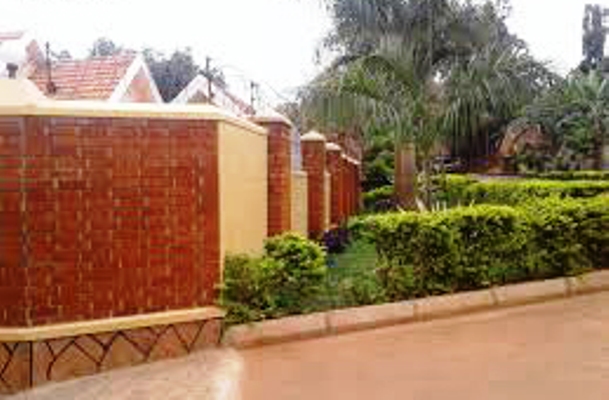Columnists
Tax perimeter walls to incentivise equity
We need to start creating a culture that considers perimeters as anti-social, thoughtless or even immoral!

Perimeter walls which don areas like Naguru
For years, I have decried the fact that Ugandans are no longer sleeping. The poor do not sleep because they are hungry, and the rich do not sleep because the poor are awake.
I have explained why this is the case. Our failure to care about the thousands of the youth roaming the streets of Kampala and other major towns, unemployed, has deprived us of the freedom to enjoy the fruits of our labour. By ‘our’ I refer to Ugandans with some little money, over and above the national median income.
Out of fear that the young men and women who are not only hungry but also feeling deprived of and cheated by those who have material possessions and other unfairly distributed opportunities might break into our homes uninvited in the night, we unwisely opted for perimeters and CCTVs.
Today, every good-looking house (and even houses that do not look so nice) is enclosed in tall perimeter walls. On top of the perimeters are electrified wire obstacles, permanently watched by armed guards and a pack of dogs. All inlets into the house (doors, windows, and ventilators) are fitted with burglar-proof and locked using massive padlocks.
Overwhelmed by ‘insecurity’ (we think so, although I prefer to call it poor economics), our leaders have gone public advising Ugandans to buy and fit their homes with closed-circuit television (CCTV) cameras.

CCTV Cameras now rule the rich man’s home for fear of thieves
Price of rent seeking
It is poor economics that bred more inequality, and we think we shall solve its ramifications using architecture and ICT!
When we allowed so much rent seeking, of all forms — corruption, regressive taxation, predatory financial dealings, and upward transfer of resources from relatively-poor people to people who are much better-off, we turned Uganda into a country of the haves and the have-nots.
The few halves are now protecting their positions by destroying the escape routes behind them. They use their political and business positions to achieve this.
It is now easier for rent-seekers to influence policy in Uganda than ever before. As we all know, the economy is a set of processes and policies, and the interaction between these processes and policies produces various outcomes. Inequality is one of the outcomes, other being slow economic growth and inefficient markets.
I strongly believe that rent-seeking is the main problem facing Uganda’s economy today. Well educated people are living horrible lives while ‘dealers’ are flourishing.
Any nonpartisan economist knows that policy works more effectively when those with higher incomes pay higher tax rates than those with lower incomes.
Don’t tax houses; tax perimeters
Economics also teaches us that income matters in people’s wellbeing only when it is little. Too much money buys just a little happiness. Economists use a concept “diminishing marginal utility” (DMU) to explain why this is the case.
DMU is the common-sense idea that an extra shilling is worth a lot less in satisfaction to people with very high incomes than to those with low incomes. Give a family with a monthly income of Shs.100,000 an extra Shs.10,000 and it will make a big difference to their lives. Give another that earns Shs. 20 million a month an extra Shs. 10,000 and they will barely notice it.
What this implies for economic policy is that we should not care what a policy does to the incomes of the very rich. A policy that makes the rich a bit poorer will barely affect their life satisfaction, since they will still be able to buy whatever they want.
Therefore, the optimal tax rate on people with high incomes is the rate that raises the maximum possible revenue. Such a tax will not affect the incentive structure neither will it change the behaviour of the rich as long as it is not 100%. Yet it will positively affect the rest of the population.
It is this economics, well-grounded in solid research, which has got me thinking: instead of increasing domestic borrowing which negatively affects the credit markets, why doesn’t government raise more tax revenue by taxing not houses but perimeter walls and idle lands.
Incentives for a more equal society
I know taxes are not the most popular policy proposal one may make, but taxing perimeter fences can be one of such duo-target policies government should consider. It will help government raise quick revenue while at the same time create incentive for a more equal society.
I have not yet done the maths, but my damn feeling tells me the value of perimeters in Kampala, Wakiso, Entebbe and Mukono alone could perhaps build low-cost houses for all, or at least a big majority of the homeless/poorly domiciled people in these towns.
Some people have even started ornamenting perimeter walls to the extent that they are better-looking than houses where some middle-class folks reside. Here is the solution: Let government levy a 50% tax on the value of all perimeter walls (both old and planned).
Such a tax will take the form of a Pigouvian tax (meant to discourage activities that impose a net cost of production to society). In economics, the main purpose of Pigouvian taxes (named after British economist Arthur Pigou, who first proposed a tax of a kind) is to oppose inefficiencies by increasing the marginal private cost by the amount generated by the negative externality created.
Perimeters create negative externality (a cost that is suffered by person who is not part an economic transaction). They waste money that should be used to produce better-value goods and services. They expose families without perimeters to more robberies since with everyone else encircled in perimeter walls the element of neighbourhood watch/security is lost.
Economics of neighbourhood
Perimeters also ignore our neighbours’ desire to interact with us, and also ignore the wellbeing of bystanders (to see beautiful houses and healthy-looking children). They also implicitly promote insecurity instead of reducing it, when bad elements turn perimeter walled houses into safe heavens.
Additionally, the economics of neighbourhood teaches us that perimeters deprive the urban economy of residents’ activities and social networks, kills housing vintage and appeal.
With taxes, the rich folks might not pull down their perimeters. They will pay the money which will help government to subsidise the cost of housing for low-income earners.
Cumulative increases in the tax, say from 50% to 70% of the value of the perimeter, might eventually elicit distress among the perimeter builders. The optimal perimeter tax will be established when folks start to choose between either building low-cost perimeters (to avoid paying a higher tax), or abandoning the perimeters altogether (to avoid the tax).
Either way the wellbeing of society will improve. First, the resources wasted on the lavishly constructed perimeters will be saved and deployed more efficiently. Second, if people opt to abandon perimeters altogether, they will be more willing to contribute to policy that creates a more equal and just society since their ‘hiding places’ will be gone.
We can’t be safe by locking ourselves
This is good economics that should be promoted by any society where the interests of individuals and society do not coincide. We need to start creating a culture that considers perimeters as anti-social, thoughtless or even immoral.
Market economics is supposed to organise society in a way that leaves everyone better off, not a few people. When the state left us to decide what we want to do with our lives, we built walls that encouraged us to start behaving like stray dogs – caring only about ourselves and the few people close to us.
Many low income people try hard to meet their responsibility to contribute to society, but society is not meeting its responsibility to them. Instead, thieves of government money, rent seekers, monopolists, and cartel managers accuse the poor or low-income earners as lazy and lacking in initiative!
Perimeters are a symbol that everyone suffers in an unequal society. Equality is good for everyone, more so for the rich. Like the economic philosopher John Rawls once put it, society is better off when it maximises the welfare of the lowest group.
I strongly believe the perimeters around everyone’s home have duped us into thinking we can be safe by locking ourselves in those tall walls. The truth of the matter, a lasting solution resides in good economics not brilliant architecture.
Comments





















